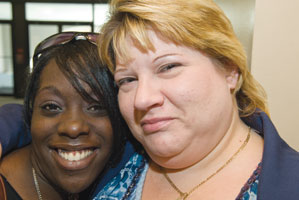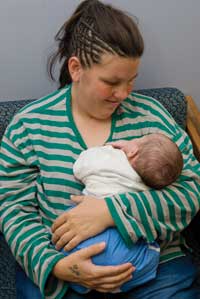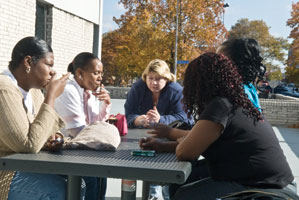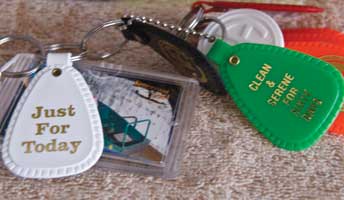|
January/February 2009 Issue Connecting People With a Drug-Free Future
Delores is clean for the first time in 13 years while she stays at the residential Family Treatment Center (FTC), run by FamilyLinks in Pittsburgh. The FTC provides Delores and other women who are recovering from addiction with a structured therapeutic milieu, including parenting classes, group meetings, and workshops on HIV/AIDS and risk management.  Kimberly, who has been diagnosed with bipolar disorder, has stayed at the FTC since August and now speaks with great excitement about the hope she holds for her and her family. Her addiction to drugs started after a bad split with her boyfriend of many years. Her depression and slide into drug use drove Kimberly from her children and led to her incarceration after stealing from her daughter. “I was walking in death,” says Kimberly. Today, she talks to her daughter often. The center provides Kimberly with daily tasks to structure her life. A copy of the Koran that she reads daily lies on her bed, as the exploration of spirituality and faith is encouraged by the agency. FamilyLinks assists families on a residential and outpatient basis. Those who are served have co-occurring disorders of mental illness and alcohol and other drug addiction. “We serve as a ‘whole family system,’” says De’netta Benjamin, MSW, senior program manager of the alcohol and other drug addiction program.  The integrated care system at FamilyLinks was created with the merger of The Whale’s Tale and the Parent & Child Guidance Center in 2001. It merged two cultures, according to Benjamin. The Whale’s Tale focused on child behavioral health, while the Parent & Child Guidance Center was therapy based. The combination brought the care for the families who experience alcohol and other drug addiction and mental illness under one roof. Kimberly and Delores will soon move on from the residential FTC to FamilyLinks’ Community Support Center (CSC). At the CSC, they will continue to set goals for the next phase of their individual treatment plans. The linkage of care from the FTC to the CSC gives clients a base of help when problems arise. For clients, starting life over clean is a difficult step forward. Like nicotine addiction, the most common and lethal form of addiction in the United States, a person may need to quit many times before they are successful. Laura Bartolomucci-James, MA, a therapist with FamilyLinks, notes that the challenges clients face stepping back onto the streets are big. “I have been here a year and have had two successful discharges,” she says. “That’s just the nature of the beast.” Once per month, the CSC day treatment therapy group commemorates the accomplishments or successes the members achieved during the previous month. A cake sits on the table waiting to be sliced and eaten. “Today, I am celebrating seven months clean,” Von tells the group. “Tonight, I will see my son.”  The reasons for celebrating can be emotional triumphs such as reunification or something simpler that people normally take for granted, such as having a permanent address or paying an electric bill. The struggle with addiction continues, but the program provides the women with the opportunity for a drug-free future. “You can’t make up the past,” explains Nicole Amond, BSW, CAC, CCDP, the CSC’s program manager. Amond leads the group discussion, emphasizing the challenges each member faces but also the rewards. “Every day you succeed, your actions provide an example for the future,” says Amond. The group offers words of encouragement to each other, especially when they feel the danger of addiction. “Every time I get a craving, I hit the knees [to pray],” says Tamara. She recalls her past as motivation to stay clean and working. “Back in jail, I would be boo-hooing, making deals with God, telling him lies.” Beating drug addiction is demanding work for both staff workers and their clients. “This is a life-and-death situation,” says Von. “I’m fighting for my life. Today, I choose to live.”
— Neal A. Newfield, PhD, ACSW, is an associate professor of social work and a documentary photographer with the division of social work at West Virginia University. — Andrew Barnes, MS, is a graduate student in journalism at the West Virginia University Perley Isaac Reed School of Journalism. |

 Toys and strollers line a small room. Delores holds her newborn son, Lamar, rocking him and gently tapping his bottom as she quietly recalls her addiction to drugs and alcohol. “It started when I was 16, when my grandfather died and then my mother died,” she says. “My father used. He was on everything. He wasn’t in my life, so I just went from place to place.”
Toys and strollers line a small room. Delores holds her newborn son, Lamar, rocking him and gently tapping his bottom as she quietly recalls her addiction to drugs and alcohol. “It started when I was 16, when my grandfather died and then my mother died,” she says. “My father used. He was on everything. He wasn’t in my life, so I just went from place to place.”  The support the agency provides acts as a lifeline for new mothers such as Delores or the members of the day treatment group who lead each other out of the darkness and hopelessness of the streets. Simple acts such as enrolling in a program and waking up each morning to report to the day treatment facility become life affirming.
The support the agency provides acts as a lifeline for new mothers such as Delores or the members of the day treatment group who lead each other out of the darkness and hopelessness of the streets. Simple acts such as enrolling in a program and waking up each morning to report to the day treatment facility become life affirming.